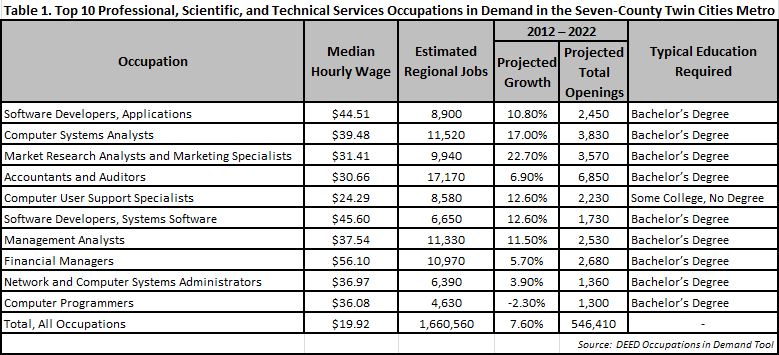 The Minneapolis-St. Paul metropolitan area is a national leader in finance, advanced manufacturing, agriculture and retailing.
The Minneapolis-St. Paul metropolitan area is a national leader in finance, advanced manufacturing, agriculture and retailing.
Medical devices, electronics and processed foods are strong suits recognized globally.
Want the freshest data delivered by email? Subscribe to our regional newsletters.
3/2/2015 2:23:55 PM
Tim O'Neill
Since employment in Minnesota hit its recessionary low more than five years ago, the state has regained nearly 223,000 jobs that span a broad spectrum of industry sectors.
Much of the analysis of this growth has centered on the healthcare and social assistance, construction, and manufacturing sectors - and for good reason.
Healthcare and social assistance is the largest-growing industry sector.
Construction is the fastest-growing industry sector. And manufacturing is so important that we give the industry its own special week.
There is another major industry sector, however, that is vital to Minnesota's economy, especially within the seven-county Twin Cities metropolitan area. The sector is professional, scientific, and technical services. With nearly 109,000 workers in the region, about 77 percent of this sector's total employment statewide is concentrated in the metro area.
The sector's largest employing subsectors in the region include computer systems design; architectural and engineering services; legal services; management, scientific, and technical consulting services; and accounting, tax preparation, bookkeeping, and payroll services; and smaller subsectors like specialized design services, scientific research and development services, and advertising, public relations, and related services.
The good news is that the professional, scientific, and technical services industry sector is continuing to grow within the metro area. Between the second quarters of 2009 and 2014, this industry added more than 11,000 jobs, growing at a rate nearly twice as fast as the labor market as a whole. According to our Employment Outlook tool, this sector is projected to expand by 15 percent through 2022, adding more than 16,000 jobs and accounting for more than 12 percent of the metro area's growth during that time.
Occupations in the professional, scientific, and technical services industry sector offer significantly higher wages than the metro area's average median hourly wage of $19.92. Accountants and auditors, for example, earn a median hourly wage of $30.66. Market research analysts and marketing specialists earn a median hourly wage of $31.41 and are expected to grow by nearly 23 percent from 2012-2022.

Job seekers hoping to take advantage of this growth will need to pursue higher levels of post-secondary education and training. Our Job Vacancy Survey shows that 73 percent of metro area vacancies in this industry require some level of post-secondary education and 82 percent require at least one year of work experience. By comparison, only 40 percent of vacancies in all industries in the metro require post-secondary education, and only 50 percent require at least one year of experience.
To find out more about the current jobs in demand in the professional, scientific, and technical services industry in the seven-county Twin Cities metropolitan area, use our Occupations in Demand tool.
Contact Tim O'Neill at 651-259-7401.